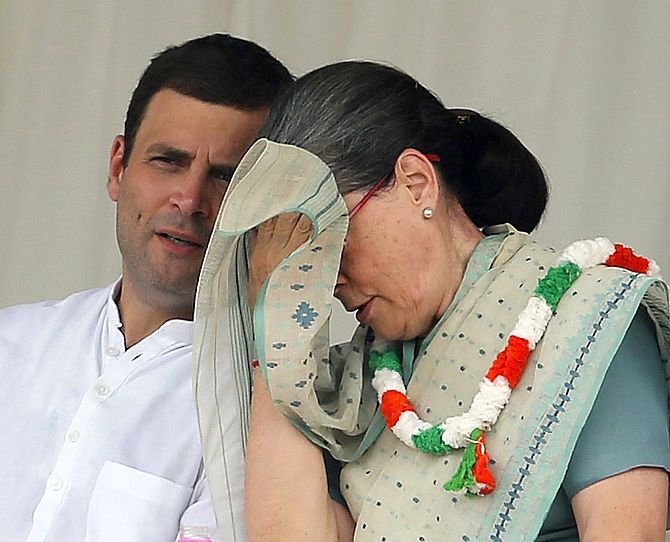Anger is brewing within the Congress party against the central leadership after the poor show in the assembly polls. Kavita Chowdhury reports.

When a Congress veteran, who has weathered several political challenges, was asked about Rahul Gandhi's elevation to the post of party president, he compared the situation to that of a 'beehive.'
"There is a queen bee in every hive but she alone can do nothing; she cannot make honey unless the army of worker bees chip in. One person on his own cannot bring about the change. This is not the task for any single individual," said the leader.
The Congress' poor performance in the recent assembly polls has triggered voices of discontent within the party. Although nobody has directly targeted the Congress president or vice-president so far, the anger against the top leadership is palpable.
While Digvijay Singh called for a "major surgery", rather than yet another round of "introspection", Rajya Sabha member and party spokesperson Abhishek Manu Singhvi had a detailed prescription for "new, younger state faces, new Congress Working Committee, shunting out old, usual faces to advisory roles...".
Another Rajya Sabha member, a known Rahul loyalist, said: "The only thing that counts is when Rahul Gandhi will take over. That will settle the uncertainties."
The impatience of Congressmen with the party's inability to bring about organisational overhaul, pending since 2014, is visible now. In fact, a reshuffle of the All India Congress Committee was promised in 2013 at the Jaipur Chintan Shivir, when Rahul took over as vice-president.
A series of electoral setbacks since, barring the Bihar poll victory, has not only led the ruling Bhartiya Janta Party to declare a "Congress mukt Bharat" (an India without Congress), it has also raised questions within the party of an "existential crisis".
Even as arguments such as "Rahul Gandhi not being given a free hand" are dished out liberally to shield him from criticism, there is a battle raging within the party of those who want to see a change in the saddle and those who want the status quo to continue.
For one, Sonia commands fierce loyalty within the party, cutting across all sections.
Senior leaders entrenched in the party, who are used to her style of functioning and leadership, feel threatened by the prospect of a change in the top leadership.
Quiz them about it and pat comes the reply, "No, it's all about survival of the fittest."
They insist it is not about the 'old guard versus young brigade' duel but allege the real issue is the doubts on Rahul's leadership.
The unpredictability of the Gandhi scion's style of functioning has not endeared him to many within the party. Many say he's reactive rather than pro-active, leaving many Congressmen unsure of what the leadership wants.
The Congress' defeat in the Assam polls has dented Rahul's image further.
Those close to him, however, counter the "false narrative" by "defector Himanta Biswa Sarma" who projected the Congress vice-president as "an arrogant leader", who has no time or interest in regional leaders but prefers "playing with his dog".
They allege such "lies" have "marred" Rahul's image. They ask if that was the case, how come Sarma could grow to become the number two in the party's state unit. They say Sarma's "unrealistic demand" of wanting to be the chief minister could not be met.
Soon after the assembly results came, Nationalist Congress Party's Tariq Anwar said: "If Soniaji gives up her party's leadership, then it will send a wrong signal to the ruling party, giving them the sense that their pressure tactics are working. Also, such a move will demoralise Congress workers. So, she should continue to be in that slot."
The NCP insisted that the United Progressive Alliance partners had not moved away from the Congress and only someone like Sonia could bring secular forces together against the BJP's "communal juggernaut".
What hasn't helped Rahul's case is the series of decisions after 2014 that have come a cropper. Giving in the demands of the West Bengal unit, the Congress agreed to an unlikely alliance with old foe Communist Party of India in the state. However, Mamata Banerjee emerged with a larger mandate of 211 seats, bigger than 2011's 'Trinamool Congress wave' that brought her to power.
Even as he appointed young chiefs to head Pradesh Congress Committees -- Sachin Pilot in Rajasthan, Ashok Chaudhry in Bihar, Ashok Tanwar in Haryana, etc -- Rahul kept faith with octogenarian Tarun Gogoi in Assam, letting him lead the party into the crucial assembly polls despite a three-term anti-incumbency mood risk. The decision boomeranged, with fingers pointing at Rahul for alienating the younger, dynamic Sarma.
To stem the overwhelming tide of criticism, the Congress has resorted to betraying a sense of denial, questioning whether the whole poll debacle was indeed a loss of face for the party substantiating its stance, citing how the Congress bounced back after the defeats of 1977 and 1989.
Possibly warning against such complacency of his party colleagues, Salman Soz was quoted as saying: "Regional parties are entrenched and the Congress cannot take for granted that in a national election; people will automatically turn to us if Narendra Modi disappoints."
With Congress looking uncertain, desperate state unit chiefs have resorted to a bizarre test of loyalty. The West Bengal PCC has got its new MLAs to sign bonds of allegiance to Sonia Gandhi and Rahul Gandhi on Rs 100 stamp papers.
While this has invited ridicule from all quarters, what remains to be seen is whether Rahul will get the better of the party or if the party will get the better of him.













 © 2025
© 2025